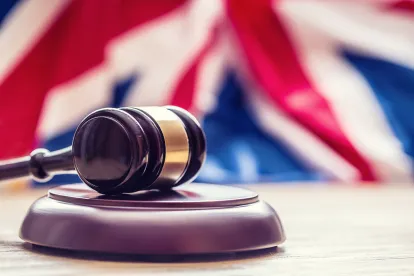The English Court of Appeal has provided some helpful guidance as to the relevant test for determining the law applicable to arbitration agreements (as distinct from (i) the governing law of the relevant contract, and (ii) the “law of the seat of arbitration” or the “curial law”).
Significantly, the Court of Appeal, in finding that, subject to any “powerful countervailing factors,” there is a strong presumption that the parties impliedly chose the law of the seat of the arbitration as the law applicable to the arbitration agreement, departed from the test outlined in Sulamérica Cia Nacional De Seguros SA & Ors v Enesa Engenheria SA & Ors. [1] In Sulamérica, the court had decided that the implied law of the arbitration agreement would often be the same as the governing law of the substantive agreement.
In Enka Insaat ve Sanayi AS v OOO “Insurance Company Chubb” and Others, [2] the Court of Appeal allowed an appeal against a decision of Mr Justice Andrew Baker, who had refused to grant an anti-suit injunction to restrain proceedings brought by the first defendant in Russia in what the claimant asserted was a breach of an arbitration agreement between the parties.
High Court decision on anti-suit injunction
The claimant (Enka) is a Turkish construction and engineering company with a substantial presence and history of operations in Russia. The first defendant (Chubb Russia) is a Russian company and part of the well-known Chubb insurance group.
Chubb Russia had commenced proceedings against Enka and 10 other parties in the Moscow Arbitrazh Court, seeking damages in relation to a fire in February 2016 at the Berezovskaya power plant in Russia with regard to contractual arrangements for Enka’s participation in building the power plant.
Enka issued an Arbitration Claim Form in the Commercial Court in London seeking (i) a declaration that Chubb Russia was bound by the arbitration agreement in the building contract and that it applied to the Moscow claim, and (ii) an anti-suit injunction pursuant to section 37 of the Senior Courts Act 1981 restraining Chubb Russia from continuing the Russian proceedings in breach of contract.
Mr Justice Baker at first instance concluded that Enka’s delay and failure to pursue arbitration in Russia were sufficiently strong reasons to refuse to grant an anti-suit injunction. However, his preferred ground was that the English court was not the appropriate forum in which to determine what he called the “real issue” between the parties, namely, whether the obligation to arbitrate disputes extended to the dispute over Enka’s liability in the Moscow proceedings. He concluded that the appropriate forum for that determination was the Moscow Arbitrazh Court.
Successful appeal
Lord Justice Popplewell, giving the Court of Appeal’s judgment, found that the trial judge’s approach was wrong in principle. He found that:
- The real significance of the choice of a seat is not (as some people assume) a practical one as to, for example, where hearings of the tribunal will be held, but rather a legal one as to the “curial law” and the “curial court.” The choice of seat also determines where the award is made for the purposes of whether it is an award governed by the New York Convention.
- Curial powers can apply before there is technically any arbitration to supervise. The judge therefore preferred the formulation “curial law” to phrases like “supervisory powers” conferred by the choice of the seat.
- The English court as the court of the seat of the arbitration exercising curial powers was an appropriate court to grant an anti-suit injunction.
- Questions of forum conveniens (i.e., whether the Moscow Arbitrazh Court might be the appropriate forum to assess the scope of the arbitration agreement) did not therefore arise.
Governing law of the arbitration agreement
Lord Justice Popplewell went on to outline a three-stage test applicable to determining the proper law of an arbitration agreement (the AA law).
- The AA law is to be determined by asking (i) is there an express choice of law; (ii) if not, is there an implied choice of law; and (iii) if not, with what system of law does the arbitration agreement have its closest and most real connection?
- Where there is an express choice of law governing the main contract, it might also amount to an express choice of the AA law. Whether it does so will be a matter of construction of the whole contract, including the arbitration agreement, applying the principles of construction of the main contract law.
- Subject to any “powerful countervailing factors” in the facts of the case, there is a strong presumption that the parties impliedly chose the law of the seat of arbitration (the curial law) as the AA law. This third limb is a significant departure from the Sulamérica test.
Applying these principles to the case, the judge concluded:
- The governing law of the contract was Russian law by implication, but this was not an express choice of the parties since the definition of “applicable law” in the contract only specifically applied to those obligations in the contract where that definition was used.
- Applying the principles of construction to the arbitration agreement, the presumption applied that the parties impliedly chose that the AA law should coincide with the law of the seat of arbitration (the curial law) and be English law.
- There were no “countervailing factors” to rebut that presumption.
Comment
The case is a reminder of the problems that can arise when parties do not clearly distinguish in their contracts between the governing law of the contract, the law of the seat of the arbitration (curial law), and the AA law. There remain ambiguities relating to how the courts will apply the second limb of the test outlined by Lord Justice Popplewell (i.e., under what circumstances will they determine that the AA law is the same as the express choice of governing law in the main contract). It would accordingly be sensible for parties expressly to specify the choice of law governing their arbitration agreement in addition to the provision as to the governing law of the contract.
Notes
[1] [2012] EWCA Civ 638.
[2] [2020] EWCA Civ 574.




 />i
/>i
